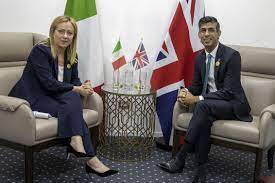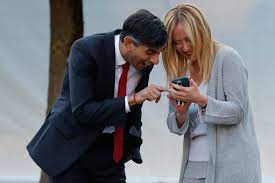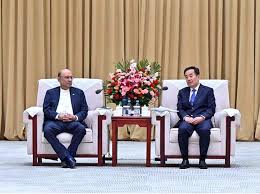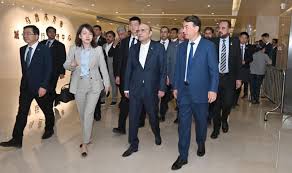Why Rishi Sunak loves Italy’s Giorgia Meloni

Rome: When Rishi Sunak invited national leaders to attend his Bletchley Park AI summit last month, just one showed up: Giorgia Meloni.
Sunak is this weekend returning the favor, attending a political festival organized by the far-right Italian premier — who is increasingly becoming the British Conservative prime minister’s political soulmate.

Sunak’s spokesperson told journalists this week that the pair — regularly pictured laughing and joking together at meetings — “obviously get on.” He put their close relationship down to the fact they were elected at “at similar time.”
But ties between the two prime ministers run much deeper, with common intellectual inspiration, shared policy goals, and concrete political and diplomatic reasons for them to stick close. Both leaders need each other, albeit for different reasons.
“Sunak needs a key political ally amongst the larger member states in Europe,” one EU diplomat — like others in this piece, granted anonymity to speak frankly — said. “He tried with France, but the bromance with Macron didn’t really work.”
A Franco-British summit and a state visit from King Charles later, France has still managed to be a thorn in the U.K.’s side on issues like electric vehicle tariffs.
Neither has the British PM managed to really hit it off with Germany’s center-left Olaf Scholz, drawn from a very different political tradition to Sunak. A close relationship with Spain’s Pedro Sánchez is also made difficult by the lingering dispute over Gibraltar.
But Italy’s leader has been only too happy to return Sunak’s diplomatic overtures, providing him with a crucial ally on the European Council. And she has her own reasons for doing so.
“Meloni needs to showcase that she is accepted by the big guns around the world,” the same diplomat quoted above said. Sunak’s blessing has a legitimizing effect on a leader who might otherwise have found herself shunned for her political origins, which sit well outside the European mainstream.
Meloni entered politics through neo-fascist youth movements, and is on the record as having praised dictator Benito Mussolini as “a good politician,” claiming that “everything he did, he did for Italy.” She has since accepted that he made “mistakes,” including imposing race laws.
As the leader of Brothers of Italy, the party she founded in 2012, Meloni has set out a staunchly nationalist agenda, focusing relentlessly on immigration and warning Italy could become “Europe’s refugee camp.” And it is on migration where she finds the most common ground with Sunak.
In October, Meloni attacked Italian judges for blocking her government from deporting people to unsafe countries, mirroring Sunak’s own running battles with the U.K.’s judiciary over its Rwanda scheme. Last month she signed a deal to send migrants arriving in Italy to Albania for processing – an approach which bears some similarities to the U.K.’s Rwanda scheme.
“Having a sea border puts Italy and the U.K. in the same situation of needing to move immigration checks to the external border, as once checks are done internally it becomes impossible to manage,” Nicola Procaccini, a senior politician in Meloni’s Brothers of Italy party, and one of her oldest friends, told POLITICO. “Both have the same objective: to move immigration management outside our borders.”
In both cases, Sunak has arguably gone further than Meloni: after losing its court battle, he announced he would legislate to instruct courts to consider Rwanda safe, whatever the evidence. The U.K.’s removal scheme also intends to resettle people in Rwanda permanently, rather than only to have their cases processed.
The similarities between the two leaders’ agendas isn’t necessarily a surprise. Meloni is president of the European Conservatives and Reformists (ECR), founded by the Tories as a more right-wing alternative to the European People’s Party. In the European Parliament “the Tory MEPs kind of courted Meloni,” one long-serving European Parliament aide remembers.
During the 2022 election campaign Meloni cited her leadership of the ECR in a bid to head off concerns she was too extreme, explicitly playing up the fact that it “shares values and experiences with the British Tories.” She and Sunak also have a shared admiration for the late British conservative philosopher Roger Scruton, who Meloni quotes frequently and has described as one of the “great masters of European conservative thought.”
There is undoubtedly a personal element to the partnership beyond the raw politics: the pair took office within days of each other, are similar ages and both have young daughters, which one U.K. official said had helped them bond. They are also both “firsts” — Meloni is Italy’s first woman premier and Sunak is the U.K.’s first British Asian leader.
Polls suggest, however, that Sunak and his government are on the way out next year. So could Meloni be backing the wrong horse?
Labour leader Keir Starmer, Sunak’s center-left successor if the polls are right, would certainly be an awkward fit at Meloni’s political festival, whose alumni include former Donald Trump adviser Steve Bannon and Hungary’s Viktor Orbán.
Yet the relationship between Italy and the U.K. will likely remain of strategic importance whoever is in charge in either capital.
Diplomats point to London’s appointment of Ed Llewellyn — a former Downing Street chief of staff regarded in ambassadorial circles as a heavyweight — as the U.K.’s ambassador in Rome as a sign the country takes Italy seriously. Meloni and Llewellyn have a strong relationship, texting each other directly in a manner not always typical of diplomats and prime ministers.
Strategically, Italy will also remain a transit country for irregular migrants coming to Europe, even if a future British government breaks with Sunak’s hardline approach on immigration.
The U.K.’s isolation from other EU member states is, of course, largely a problem of the Conservative party’s own making since 2016. Sunak’s successor, if they are of another political persuasion, may simply have more friends to choose from.





